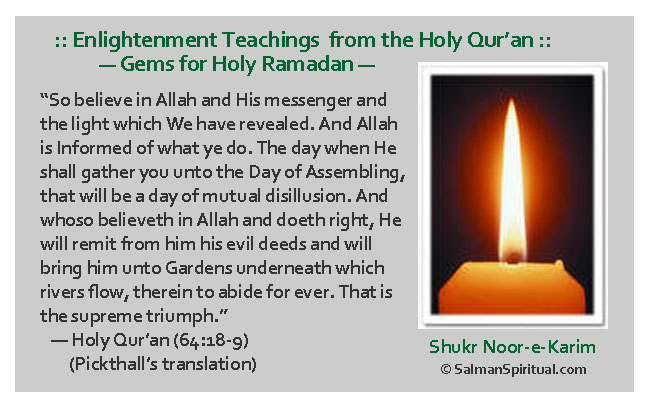

"Their light will run before them and on their right hands; they will say: Our Lord! Perfect our light for us, and forgive us! Lo! Thou art Able to do all things." — Holy Qur'an 66:8
:: Trait No. 23: The Dā'ī Should Do What He Says ::
Wednesday,
Dec. 17, 2025
Bismillahir Rahmanir Rahim
In the name of Allah, the Most Beneficent, the Most Merciful.
I have added a short section on the 'Significance of Laylat al-Qadr' and have followed up with the usual sequence of content in this post:
Ya Ali Madad and Ramadan Mubarak. This post consists of five parts
Significance of Laylat al-Qadr:
Here is a concise description of Laylat al-Qadr:
| 'Laylat al-Qadr: (lit. "night of power" or "destiny"). The night in the year 610 A.D. in which the Koran descended, in its entirety, into the soul of the Prophet. It is one of the last ten nights of the month of Ramadan. For this reason, the last ten nights of Ramadan are taken to be particularly holy. On that night, the Angel Gabriel first spoke to the Prophet, the Koran was revealed, and the Divine mission began.
The Surah 97 describes the Night of Power as "better than a thousand months ...peace until the rising of the dawn." It is related the A'ishah, the Prophet's wife, explained that Laylat al-Qadr is the "soul of the Prophet". That is to say, since the Prophet is all of creation in the form of a man, the night corresponds to his soul. This also implies that the true nature of human soul is a receptacle of God's revelation.' |
Please note that the whole of the Holy Qur'an entered into the soul of the Holy Prophet (s.a.s.) on Laylat al-Qadr in year 610 A.D. The Holy Qur'an was revealed to the people over a period of 23 years, i.e. from the time when the Holy Prophet (s.a.s) was 40 years old till the age of 63 years when he passed away.
Part 1: Enlightenment Teachings from the Holy Qu'ran

Part 2: An excerpt from 'A Code of Conduct—A Treatise of the Etiquette of the Fatimid Ismaili Mission'
In 'al-Risāla al-mūjaza al-kāfiya fī of Ahmad b.Ibrāhīm al-Naysbūrī has written the following gem:
"[§48] A dâ'î should do what he says. Religion is the fulfillment of the covenant and the statement. If a believer sees in him slowness in fulfilling his obligation or a breach of faith, he will do likewise, and thereby the religion will be corrupted. God has praised faithfulness. He said: 'And Abraham who fulfils his engagements';64 and He said about Ismail: 'He was true to his promise and he was a messenger and a prophet.'65"
(Source: Klemm, V. and Walker, P. E., A Code of Conduct—A Treatise of the Etiquette of the Fatimid Ismaili Mission, pp.52-53)
Footnotes
64. Qur'an, 53:37.
65. Qur'an, 19:54.
Part 3: Dhikr Tasbi
Let us perform the dhikr of 'Ya Ali Mowla Ali':
Bismillahir Rahmanir Rahim
In the name of Allah, the Most Beneficent, the Most Merciful
Ya Ali, Mowla Ali
O Light of Eternal Ali, O Noor Mowlana Shah Rahim Al-Hussaini Hazar Imam
Al-hamdu lillahi rabbil 'alamin.
Praise be to Allah, the Lord of the worlds!
Part 4. Angelic Salwat
Let us recite angelic salwats to invoke Divine grace and mercy.
Bismillahir Rahmanir Rahim
In the name of Allah, the Most Beneficent, the Most Merciful
Allâhumâ salli alâ Muhammadin wa âle Muhammad:
O Allah! Bestow Peace on and through Muhammad and his Descendants
or
Al-hamdu lillahi rabbil 'alamin.
Praise be to Allah, the Lord of the worlds!
Part 5. Ardent Global Prayers
O Noor Mowlana Hazar Imam: bless the global Jamat with spiritual and luminous tayid (help) to advance materially, spiritually and intellectually; and create sunshine in our hearts and bless all of us with the inner vision of the Truth.
Haizinda — Qayampaya
(Our Present Imam is Living and His NOOR is Eternal)
Traits of an Ismaili Dai